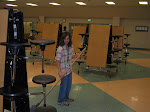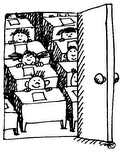
The rules of cycling also apply to life. Take care of yourself. Set goals. Learn from the experts. Share your wisdom. Be prepared."
--Karen Bliss Livingston,Olympic cyclist

Published Online: October 26, 2007
Commentary
Shift Happens
Four crazy ideas that might burst the modern education paradigm.
By Mark Weston
Evidence suggests that our modern education paradigm, which does a terrific job of educating some students to high levels of learning, may be incapable of educating all students to equally high levels. Moreover, its inability to silence critics, support normal practice, and educate all the students persists despite efforts to the contrary. Have we reached a point where a new insight or fresh perspective might burst the old paradigm?
Sound crazy? Consider three such insights from the past that contributed to much broader changes in the world. One insight, Benjamin Franklin’s idea for an American census, revealed that a few thousand British soldiers could not keep millions of colonists in line. It changed the way colonists saw their relationship with Britain and fomented a revolution. Another, Gandhi’s admonition that the peoples of India be “the change you wish to see in the world,” led to an unprecedented, nonviolent shift of power. In a third instance, Einstein’s insights into Newtonian physics demonstrated that space-time is one dimension, not two, which led to a range of new ideas, theories, and questions.
In each case, a fresh perspective fueled a paradigm shift. Are there insights whose time may have arrived that would cause us to quit propping up the existing educational paradigm—with more money, more people, more everything—in favor of an alternative? Here are four present-day educational issues, each with a possibly paradigm-bursting twist.
Increasing high-school-completion rates has been a goal of nearly every effort to improve education of the past three decades. What would happen if every child who is entitled to attend school, but not currently enrolled—about 30 percent of the school-age population—returned to school? Could the existing facilities accommodate the surge in students? Would instructors have the capacity to meet these students’ educational needs? Could the safety-net programs prevent them from falling through the cracks again? Would “adequate yearly progress” be attainable with so many more students attending school? Could class-size requirements be met? While all students may know that they have the right to attend school, few know that by simply doing so they might change the education system forever.
If feedback from all stakeholders drove educational decisions, the nature of the conversation would certainly change, quite possibly for the better.
When parents are engaged in their children’s schooling, students do better. Not surprisingly, getting parents engaged has been another widely embraced goal. With most homes and classrooms connected to the Internet, one form of engagement that warrants a deeper look is the use of e-mail. Infrequent—weekly, monthly, quarterly—now characterizes the e-mail exchanges between educators and parents. What would happen if every teacher and parent exchanged one e-mail per day, perhaps about a lesson that day and one for the next? With nearly $7 billion spent annually for educational technology, this is not an outlandish expectation. What would be outlandish is this once-a-day exchange causing havoc to the technological infrastructure of most schools. How confident are we that the system could handle the load? Would teachers have time to manage the e-mails? And if neither teachers nor infrastructure can handle an extra set of e-mails each day, then what makes us think more complex practices would be possible? In short, while engaging parents is the right thing to do, it is not clear that the current education system could withstand the consequences of that actually happening.
Most everyone agrees that feedback about performance is an essential ingredient for improving instructional practice, student achievement, and management of limited resources. Not surprisingly, nowadays data-driven decisionmaking is in vogue. What would happen if we brought the feedback loop used in the current paradigm—instructors and administrators evaluating students via formal assessments, portfolios, quizzes, and tests and parents voting on the school board’s makeup—full circle? What if, that is, students provided feedback about the performance of their instructors, instructors about administrators, instructors about parents, and parents about instructors and administrators. Would student learning increase? Would instruction improve? Would parent engagement increase? If feedback from all stakeholders drove educational decisions, the nature of the conversation would certainly change, quite possibly for the better.
School buildings throughout America—particularly those in urban areas—are in a state of decay. What would happen if, instead of simply viewing schooling as a place where students go to learn, with buildings to be repaired or replaced, we viewed school as a process through which students gained skills and acquired knowledge? Would giving computing devices to students spark the shift from place to process? Would doing so reduce the need for computer labs and classrooms? Would focusing on process lead to a learning day that produced greater achievement gains than a school day?
Crazy ideas? Indeed. The insights of Franklin, Gandhi, and Einstein in their eras were undoubtedly viewed as equally crazy, and look what changes they wrought. So while the insights posited here raise the possibility that getting what we want—higher school-completion rates, engaged parents, data-driven decisions, and school building replacements—could lead to chaos, they also might set the stage for a paradigm shift that results in all children getting the education they deserve.
Mark Weston, an education reformer and researcher living in Atlanta, is investigating the shifting educational paradigm in America. He can be reached at
mkweston@comcast.net.
Vol. 27
from
Education Week
 The rules of cycling also apply to life. Take care of yourself. Set goals. Learn from the experts. Share your wisdom. Be prepared."
--Karen Bliss Livingston,Olympic cyclist
The rules of cycling also apply to life. Take care of yourself. Set goals. Learn from the experts. Share your wisdom. Be prepared."
--Karen Bliss Livingston,Olympic cyclist
 The rules of cycling also apply to life. Take care of yourself. Set goals. Learn from the experts. Share your wisdom. Be prepared."
--Karen Bliss Livingston,Olympic cyclist
The rules of cycling also apply to life. Take care of yourself. Set goals. Learn from the experts. Share your wisdom. Be prepared."
--Karen Bliss Livingston,Olympic cyclist


